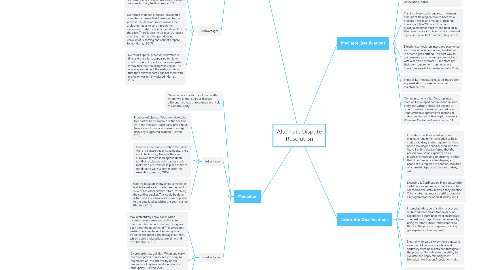
1. Arbitration
1.1. Arbitration is alternative dispute resolution method where the two parties present their case to an arbitrator who will hear all the evidence and then makes a legally binding decision.
1.2. Advantages
1.2.1. Picked Arbitrator: Both parties may select their own arbitrator based on the qualifications of their choosing. This allows an arbitrator with the correct expertise to be chosen. If the two parties cannot agree on an arbitrator they can have assistance from the court of arbitrations association (AllBusiness, 2017)
1.2.2. Cost: Just like mediation, cost is less because decisions are made quicker and less time than court mitigation. Since it is quicker, it saves legal fees. Many organizations provide arbitration service fees depending on the size of the case (AllBusiness, 2017).
1.2.3. Semi-Formal Proceedings: Arbitration is more formal than mediation, but less formal than court. Both parties present their case not to the arbitrator, but around a table which allows more relaxed rules of evidence and informal investigations allowed. The decision an arbitrator makes is just like in court, final (AllBusiness, 2017)
1.3. Disadvantages
1.3.1. Antagonism: Unlike mediation, where both parties are involved in a resolution, an arbitrator decides the outcome. This could cause the parties to feel like a win-lose, therefore causing some hostility. If the arbitrator splits the difference, both parties may feel hostility (AllBusiness, 2017).
1.3.2. No formal evidence process: Relaxed rule of evidence means that there is no formal process. This lack of process means the arbitrator needs to sort through the evidence to determine which is relevant to the case. There is also no discovery process meaning that the other part does not know what is coming and cannot prepare for it. (Murray, 2017).
1.3.3. No formal appeal process: Arbitration is final and there is no appealing to higher court. This is not good for the losing party if they feel that the ruling was unjust. The only way would be if the party can show that the arbitrator acted against them with malice or was unfairly biased (Murray, 2017).
2. Arbitrator Qualifications
2.1. Education: Each state will set their minimum requirements needed to be an arbitrator. Many states require that they have a law degree and licensed with the State Bar. It is also preferred that the person have some experience as a business professional or attorney. States that do not require a law degree, a bachelor's is required in conflict resolution or alternate dispute resolution (Lindsey, n.d.).
2.2. Licensing & Certification: Many states offer certifications and require members to be licensed in the state in which they practice. Other states just require certification from a recognized association. (Lindsey, n.d.)
2.3. Internship: Most certification processes require supervised arbitration or prior experience before becoming an arbitrator. The best way to get this experience is by being an intern. These internships allow those in the process of gaining training to get experience (Lindsey, n.d.).
2.4. Neutrality: Impartiality by the arbitrator is essential. All decisions are final and neutrality must be maintained throughout the process. This will allow the ability to evaluate and apply fair judgement (American Arbitration Association, n.d.).
2.5. Reputation: Arbitrators attempting to be certified with the NAA require letters of recommendation. These letters must highlight the arbitrator's qualifications and accomplishments. Including honors, awards, and citations showing the arbitrator's leadership. Also mentioned should be reputation for integrity, fairness, and good judgements. (American Arbitration Association, n.d.).
3. Mediation
3.1. Mediation is a conflict resolution method where two or more parties discuss different methods of resolution with help of a neutral party.
3.2. Advantages
3.2.1. Freedom of choice: Mediation allows the two parties to be involved in the solution. With the mediator, each party gives input towards a solution and is able to accept of deny any suggested solution (Benton, 2015).
3.2.2. Positive after conflict relationship: When there is a lawsuit against someone, there could be hostility towards the suer. However, if there is an agreed upon conflict resolution, both parties could maintain a civil relationship and at times continue to work together after the resolution (Benton, 2015)
3.2.3. Cost vs litigation: Many times, a mediator is able to make each party see the point of view of the other and therefore, resolving the conflict quicker. This could be done within hours or a few sessions as opposed to the time it takes within the court system (Benton, 2015)
3.3. Disadvantages
3.3.1. May prematurely show hand: When disputes are not resolved and have to continue into the court system, this gives each party the upper hand. This gives both parties the advantage of knowing what evidence the other party has against them, which, could prolong litigation, time, and cost (Benton, 2015).
3.3.2. Disproportionate abilities: When one party has more power or resources to bring to the mediation, the informality of the process could give advantage over the other party (Benton, 2015).
3.3.3. Disputed resolution: There could be a separate conflict that may arise if the original dispute is called into question. In this case, this will end up in the court system, wasting the time and money spent on mediation (Benton, 2015)
